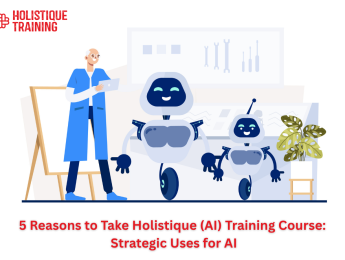- Table of Contents
- Introduction
- Understanding the Course: Strategic Uses for Artificial Intelligence
- Course Overview
- Key Content Areas
- Target Audience
- The Top 5 Reasons to Enrol in this Course
- 1. Strategic Application of AI in Your Organisation
- 2. Comprehensive Understanding of Fundamental Technologies
- 3. Accurate Evaluation of AI’s Benefits and Constraints
- 4. Addressing Ethical and Social Dimensions of AI
- 5. Planning and Managing AI Projects Successfully
- Additional Advantages of the Course
- Practical Learning through Real-World Case Studies
- Internationally Recognised Certification
- Conclusion
Introduction
Artificial Intelligence (AI) is no longer a futuristic concept; it has become an indispensable force reshaping industries, redefining business strategies, and unlocking unprecedented opportunities. Today, businesses that fail to adapt to AI-driven transformations risk falling behind in an intensely competitive global market.
Holistique Training, established in 2008, has consistently empowered professionals and organisations to embrace such technological revolutions. Known for its expertise in delivering world-class executive education, Holistique combines deep industry insights with practical learning experiences.
In response to the increasing demand for strategic AI knowledge, Holistique offers the course Strategic Uses for Artificial Intelligence. This article delves into why this course is a vital step in your professional development journey.
Understanding the Course: Strategic Uses for Artificial Intelligence
Course Overview
Strategic Uses for Artificial Intelligence is a comprehensive training programme designed to enable participants to grasp how AI can be leveraged strategically within organisations.
Its goal is to equip leaders, analysts, engineers, and decision-makers with the skills to understand, evaluate, and implement AI technologies in ways that align with organisational objectives.
Key Content Areas
The course covers the following critical areas:
- Core AI Concepts and Technologies: Participants explore essential concepts such as machine learning (ML), neural networks, and advanced algorithms. According to Holistique’s syllabus, these are explained through interactive sessions and demonstrations.
- Benefits, Limitations, and Ethical Considerations: A balanced perspective is offered, highlighting not only the transformative benefits of AI but also its limitations and ethical implications, including bias, privacy, and workforce disruption.
- Practical Application and Case Studies: Learners engage with real-world examples and exercises, preparing them to plan and manage internal AI projects. Studies published in ScienceDirect (2023) underline the value of such experiential learning in mastering complex technologies.
Target Audience
This programme is ideal for:
- Senior executives seeking to incorporate AI into strategic planning
- Business analysts aiming to deliver data-driven insights
- Data engineers and IT professionals involved in AI project deployment
By catering to a diverse audience, the course ensures that cross-functional teams can collaborate effectively on AI initiatives.
The Top 5 Reasons to Enrol in this Course
Let us delve deeper into the top five compelling reasons to enrol in Strategic Uses for Artificial Intelligence, with evidence from credible research, case studies, and real-world examples.
1. Strategic Application of AI in Your Organisation
Aligning AI capabilities with organisational strategy is no longer optional — it is a competitive necessity. AI tools such as machine learning algorithms, predictive analytics, and natural language processing can:
- optimise supply chains by forecasting demand and mitigating risks,
- personalise customer experiences through dynamic recommendations, and
- automate repetitive workflows, freeing up human resources for creative tasks.
A McKinsey & Company survey (2022) revealed that companies effectively embedding AI into their strategy were 35% more likely to outperform their competitors in profitability. This suggests that the strategic application of AI delivers measurable business impact. Holistique’s course enables participants to develop bespoke AI strategies suited to their business context, making them drivers of innovation.
2. Comprehensive Understanding of Fundamental Technologies
AI consists of a complex ecosystem of technologies, which can overwhelm even seasoned professionals. This course simplifies the landscape, helping learners understand the essentials — machine learning (ML), neural networks, deep learning, and advanced algorithms — and how to apply them practically.
According to Gartner’s AI Hype Cycle (2023), professionals who understand these core technologies are more effective at evaluating vendor solutions, reducing costs, and fostering innovation within their organisations. With this foundation, learners can confidently contribute to strategic and technical discussions while making well-informed investment decisions.
3. Accurate Evaluation of AI’s Benefits and Constraints
AI promises significant benefits — increased efficiency, cost reduction, enhanced decision-making — yet it also comes with risks: implementation failures, data biases, and unrealistic expectations. This course teaches participants to critically assess both sides, set achievable goals, and avoid common traps.
A Harvard Business Review (2023) article underscores this point, noting that 70% of AI projects fail to deliver desired outcomes because of misalignment with business objectives and overestimation of technological capabilities. At Holistique, participants learn how to properly assess feasibility, evaluate ROI, and build sustainable AI initiatives.
4. Addressing Ethical and Social Dimensions of AI
AI’s power must be harnessed responsibly, as irresponsible deployment can result in unintended consequences such as algorithmic discrimination, privacy breaches, and workforce displacement. This course addresses these issues head-on, offering tools and frameworks to guide ethical AI implementation.
Research by MIT Sloan Executive Education (2024) shows that organisations embracing ethical AI practices see 20% higher employee trust and improved brand reputation, as employees and customers increasingly value transparency and fairness. Holistique equips learners to champion ethical and socially responsible AI practices within their organisations.
5. Planning and Managing AI Projects Successfully
Successful AI initiatives require more than just technical skills; they demand meticulous planning, stakeholder engagement, and governance. Without these, projects risk being delayed, over budget, or abandoned.
According to a PwC UK report (2023), organisations with formal AI governance structures achieved a 25% faster time-to-market for their AI solutions compared to those without. This course provides practical methodologies for scoping projects, allocating resources, managing risks, and ensuring stakeholder alignment — crucial ingredients for delivering impactful results.
Additional Advantages of the Course
Beyond the five core benefits already discussed, Strategic Uses for Artificial Intelligence offers further distinctive advantages, making it an exceptional choice for professionals eager to not just understand but truly master AI. These additional advantages significantly enhance the learner’s experience, transforming theoretical insights into practical expertise and formal recognition.
Practical Learning through Real-World Case Studies
When working with dynamic and complex technologies such as AI, theory alone cannot adequately prepare professionals for the challenges of real-world implementation. The true value of learning emerges when participants can contextualise concepts, observe practical applications, and practise their problem-solving skills.
This course integrates a wealth of case studies drawn from both private corporations and public institutions, giving learners a nuanced understanding of how AI strategies are conceived, executed, and refined in diverse settings. Case studies span industries such as healthcare, retail, logistics, and government services, illustrating how AI can be tailored to vastly different organisational goals and constraints.
For instance, one case examines how a national health service employed machine learning to optimise patient scheduling, reducing wait times by 30%, while another explores how a global retailer implemented predictive analytics to manage inventory, saving millions annually. Learners not only examine these successes but also critically analyse missteps — such as failed chatbot launches or flawed facial recognition pilots — to understand where and why projects can go wrong.
A ScienceDirect (2023) study found that incorporating case studies into learning programmes improves knowledge retention by up to 40%, as participants are better able to connect abstract ideas with real-life challenges. This hands-on, scenario-based approach cultivates sharper judgment, adaptive thinking, and the confidence to lead AI initiatives effectively.
Internationally Recognised Certification
Another compelling advantage of this course is the prestigious certification that participants earn upon completion. The certificate is accredited by the British Assessment Council, a respected authority on professional qualifications, and recognised by the CPD Certification Service, ensuring that learners’ efforts count towards their formal Continuing Professional Development (CPD) requirements.
Such a credential carries weight in the competitive job market, signalling to employers that the recipient possesses verified expertise in a cutting-edge domain. Holding an accredited certificate in AI not only enhances credibility but also boosts employability across industries increasingly reliant on technological innovation.
The LinkedIn Workforce Report (2023) confirms that professionals holding recognised certifications in emerging technologies experience an average 22% increase in job opportunities compared to their uncertified peers. Furthermore, many organisations actively prefer or require CPD-accredited training for promotions and senior appointments, making this qualification a valuable career asset.
For example, one alumnus of Holistique’s course secured a promotion to Chief Innovation Officer within six months of completing the programme, citing the certificate as a key differentiator in their internal application process.
Conclusion
Artificial intelligence is no longer merely a technological trend; it is a transformative strategic enabler that reshapes how organisations innovate, compete, and thrive in an increasingly digital economy. Professionals who understand and harness its potential are not only safeguarding their careers but also driving the future of their industries.
Strategic Uses for Artificial Intelligence, delivered by Holistique Training, embodies a holistic learning experience — blending rigorous technical knowledge, strategic foresight, ethical awareness, and hands-on, scenario-based practice. With the added benefit of internationally recognised certification, this course equips learners with the tools, confidence, and credibility to lead successfully in an AI-driven world.
If you aspire to elevate your organisation’s performance, expand your career prospects, and future-proof your expertise, there has never been a better time to act. Enrol today in Holistique’s Strategic Uses for Artificial Intelligence and become a catalyst for meaningful, measurable transformation in your organisation and beyond.






















